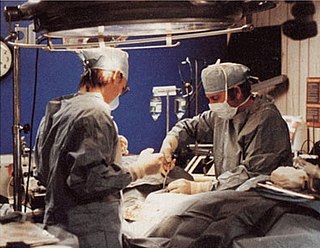
Cryonics is the low-temperature freezing and storage of a human corpse or severed head, with the speculative hope that resurrection may be possible in the future. Cryonics is regarded with skepticism within the mainstream scientific community. It is generally viewed as a pseudoscience, and its practice has been characterized as quackery.

Marvin Lee Minsky was an American cognitive scientist concerned largely with research of artificial intelligence (AI), co-founder of the Massachusetts Institute of Technology's AI laboratory, and author of several texts concerning AI and philosophy.

The Alcor Life Extension Foundation, most often referred to as Alcor, is an American nonprofit organization based in Scottsdale, Arizona, United States. Alcor advocates for, researches, and performs cryonics, the freezing of human corpses and brains in liquid nitrogen after legal death, with hopes of resurrecting and restoring them to full health in the event some new technology can be developed in the future. Cryonics is regarded with skepticism within the mainstream scientific community and has been characterized as quackery and pseudoscience.

Robert Chester Wilson Ettinger was an American academic, known as "the father of cryonics" because of the impact of his 1962 book The Prospect of Immortality.
The Immortalist Society is a charitable 501(c)(3) organization devoted to research and education in the areas of cryonics and life extension. It was incorporated as a Michigan corporation by Robert Ettinger and five other local residents on June 27, 1967 as the Cryonics Society of Michigan, Inc.. In September 1976, the name of the corporation was changed to Cryonics Association in acknowledgement that its scope of operations was not limited to a single state. On October 20, 1985, the Articles of Incorporation were amended once more to change the name to Immortalist Society.
James Hiram Bedford was an American psychology professor at the University of California who wrote several books on occupational counseling. He is the first person whose body was cryopreserved after legal death, and who remains preserved at the Alcor Life Extension Foundation.
The American Cryonics Society (ACS), also known as the Cryonics Society of America, is a member-run, California-based, 501(c)(3) tax-exempt nonprofit organization that supports and promotes research and education into cryonics and cryobiology. Cryonics is the preservation through cold storage, usually with liquid nitrogen, of humans after legal death. This procedure is done in the hopes of eventual "reanimation." Any such reanimation depends upon future technological advances that are hoped for, but by no means assured or promised.
Michael G. ("Mike") Darwin, formerly known as Michael Federowicz, was the president of the cryonics organization Alcor Life Extension Foundation from 1983 to 1988, and Research Director until 1992. He was also the founder and president of BioPreservation, Inc., and a cofounder, member of the Board of Directors, and Director of Research of Twenty-First Century Medicine from 1993 to 1999.
Jerry Donnell Leaf was Vice President and Director of the cryonics organization Alcor Life Extension Foundation, and President of the cryonics service firm Cryovita, Inc. until his cryopreservation by Alcor following a fatal heart attack in 1991.

Thomas K. Donaldson (1944–2006) was a mathematician and well-known cryonics advocate. He was born in the state of Kentucky in the United States, and took his Ph.D. from the University of Chicago in 1969. He also lived in Sunnyvale, California, and for many years in Canberra, Australia, where he taught mathematics at Australian National University. He founded both the Cryonics Association of Australia and the Institute for Neural Cryobiology, which has funded ground-breaking research in cryopreservation of brain tissue.
Curtis Henderson was a pioneer in the practice of cryonics.
Saul Kent is a life extension activist, and co-founder of the Life Extension Foundation, a dietary supplement vendor and promoter of anti-aging research. He is also a pioneer in the practice of cryonics, and was a board member of the cryonics organization Alcor Life Extension Foundation.
Frederick Rockwell Chamberlain III and his wife Linda were the founders of the cryonics organization Alcor Life Extension Foundation. Their long and continued history of activism in cryonics make them among the most well-known cryonics pioneers. David Pascal wrote in the November/December 2005 issue of the Mensa Bulletin that, second to the man credited with the original idea for cryonics, Robert Ettinger, the Chamberlains have contributed more than anyone to the field of cryonics.
Following is a list of topics related to life extension:
The following outline is provided as an overview of and topical guide to life extension:
Dora Kent was the object of a 1988 legal controversy about whether she had been murdered to facilitate her cryonic suspension. She was Alcor's eighth patient and the oldest at that time to ever be cryopreserved. She was the mother of Saul Kent, a board member of Alcor. In her earlier years, Kent worked as a dressmaker in New York City.
Larry Johnson is an American author and former employee of the Alcor Life Extension Foundation (Alcor), a cryonics company for whom he once served as a paramedic. He received notoriety with the release of the August 13, 2003 issue of Sports Illustrated. Sports Illustrated sportswriter Tom Verducci, along with Johnson's input, published an article about “What Really Happened to Ted Williams?" Immediately following the Sports Illustrated article, Johnson agreed to an interview with Diane Sawyer of Good Morning America.
Cryonics – Freeze Me is a television documentary programme created by ZigZag Production for Five in 2006 for in their Stranger than Fiction series. The program's main topic is cryonics and mainly features interviews with Alcor Life Extension Foundation staff or Alcor members. The documentary is narrated by Michael Lumsden. Directed by Virginia Quinn.
Life extension is the idea of extending the human lifespan.

Cryonics Institute (CI) is an American not-for-profit corporation that provides cryonics services. CI freezes dead humans and pets in liquid nitrogen with the speculative hope of restoring them with technology in the future.





